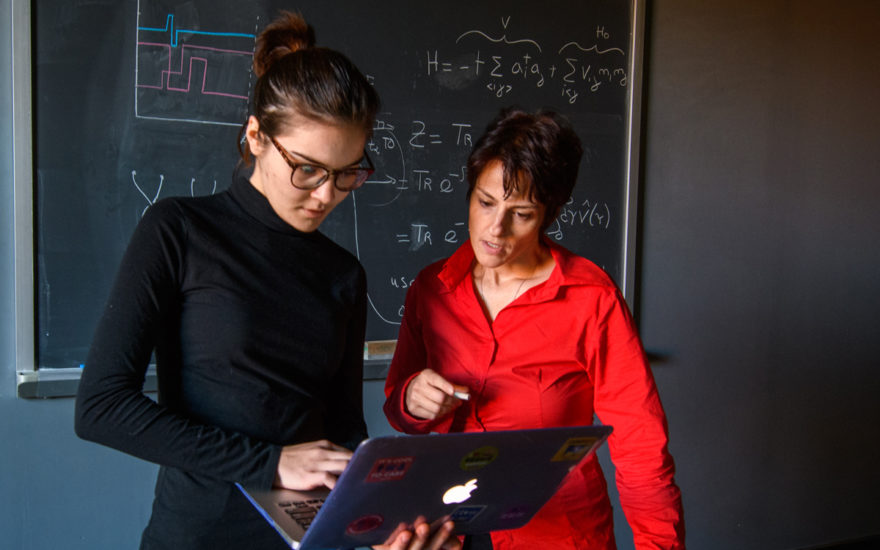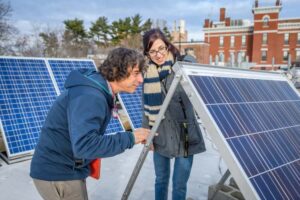Through our hands-on learning approach, you’ll put your studies into motion the moment you arrive on campus. You’ll explore the fundamental laws and principles that govern our universe — from atomic theory to quantum thermodynamics.


Why Study physics at Clark?
- Pursue your undergraduate degree in a department that’s been home to some of the most influential physicists in the world, including Arthur Gordon Webster, founder of the American Physical Society; Albert Michelson, the first American Nobel laureate in science; and Robert Goddard, the father of modern rocketry.
- Use state-of-the-art research facilities, including access to a 50-tesla pulsed magnetic field laboratory — one of the highest magnetic fields available at any university in the United States.
- Complete internships in cutting-edge research labs at Clark, or at other research institutions around the country, which prepare you for careers in diverse fields.
- Take advantage of our 3/2 engineering program, which pairs a B.A. from Clark with a B.S. in engineering from Columbia University.
4 + 1—An advanced degree within reach
The 4+1 Accelerated Master’s provides an opportunity to earn a pathway to a master’s degree — with one year of additional study and available tuition scholarships. Consider the following options for this major:
- Apply
- Request Info
Are you ready to take the first step?
Featured Courses

Computer Simulation Laboratory
Build competency in object-oriented programming while you explore the diverse applications and methods of computer simulation and apply your knowledge to projects of your choice at your own pace.

Information Theory, Inference, and Networks
Investigate the basic concepts of information theory and its applications to statistical inference and network theory.

Technology of Renewable Energy
Get hands on with Clark’s microgrid by mounting solar panels, building wind turbines, and connecting electrical systems while learning about renewable energy.
The physics major, which requires a minimum of 18 courses to complete, can be customized to meet your interests. We offer three tracks to choose from, depending on your career goals: the comprehensive physics track, applied physics track, and general physics track. In addition to core physics courses, you can take specialized courses in pre-professional physics, biological physics, fluid dynamics, information theory, the technology of renewable energy, electronics, and computational physics, and explore related fields such as environmental studies, management, government, law, medicine, and teaching. You can also pursue the major as part of the 3/2 engineering program with Columbia University. If you’re considering a career teaching physics at the high school level, we encourage you to check out the Noyce Scholarship program.
Our physics program is aimed at helping you develop both an understanding of physical phenomena and your problem-solving and analytical-thinking skills. Throughout the physics major (or minor), you will spend a great deal of time thinking deeply about physics and working in the laboratory to discover how physical systems work. Starting with the introductory physics sequence, all our courses prepare you to apply your knowledge of physics and mathematics to study real-world and unsolved problems. Near the end of your junior year, or earlier, you can choose a topic for your capstone project.
Curriculum update
Effective fall 2025, Clark offers new majors a B.S. in Finance instead of a B.A. Contact your advisor for details.
At Clark you’ll get more than a great education; you’ll also be prepared for a long, productive career and life of consequence. And once you’ve completed your degree, you can join other Clark alumni who have gone on to work for great organizations and attend some of the best graduate schools in the world.
The following communities may be of interest:
Science Data, and Technology
Physics Assistant
Mevion Medical Systems
High School Physics Teacher
Braintree Public Schools
Lab Supervisor
Janis Research Company
Engineering Intern
SolarOne, Inc.
Web Application Developer
Networked Information Services
Graduate schools attended by physics graduates from Clark include:
- University of Chicago
- University of Southern California
- Carnegie Mellon University
- Cornell University
- Harvard University
The Clark Experience
The Clark Experience brings together the exceptional education you’ll receive in the classroom and so much more. Through focus and flexibility, it ensures you’ll leave Clark with the creativity, confidence, and resilience to succeed and lead a life of meaning and consequence.
Frequently Asked Questions
What can I do with a major in physics?
At Clark you’ll get more than a great education; you’ll also be prepared for a long, productive career and life of consequence. And once you’ve completed your degree, you can join other Clark alumni who have gone on to work for great organizations and attend some of the best graduate schools in the world.
What skills will I learn?
- Practical problem-solving skills
- Critical and creative thinking skills
- Quantitative and qualitative reasoning
- Computational and mathematical methods used to learn and explain physical concepts
What facilities and labs are available?
You will be able to use research-grade and advanced laboratory equipment, including a scanning tunneling microscope, an atomic force microscope, a SQUID magnetometer, and an X-ray-computed tomography system. We have well-equipped teaching laboratories dedicated to computer simulations, electronics, optics, atomic and nuclear physics, and materials science. You also will have access to the Carlson Science Library. Our electronics and instrument shops are available for use by faculty and students.
Can physics majors earn an academic achievement award?
Roy S. Andersen ’43 Award
The Roy S. Andersen ’43 Award was established by Roy S. Andersen and friends in order to increase the interest of high school students in physics and in the related sciences, including mathematics; to increase the reputation of the sciences at Clark University among high school students, teachers and guidance counselors; and to increase the public’s understanding of science.
Albert C. Erickson ’30 Academic Award
The Albert C. Erickson ’30 Academic Award was established by the Tupper Foundation in memory of the late Albert C. Erickson (Ph.D., Physics, 1934), to provide an annual award to a senior at Clark, who has done outstanding work in physics and mathematics, and who shows unusual promise in these fields.
Is there an honors program in physics?
During your junior year, you might be accepted into the physics honors program. Joining the program means you’ll work closely with a professor to create a thesis on a topic of your choice. Examples of recent honors theses topics are:
- Topographic and Spectroscopic Analysis of Cuprous Oxide Nanocubes
- Chaotic Biophysical Systems
- Building a Vertical Wind Turbine for the Math-Physics Building Nanogrid
- Analysis of Anisotropic Critical Fields in Superconductors
- Phase Relations in Biological Oscillators
- Designing a 2-Axis Solar Tracker in Order to Maximize Efficiency
Be a force for change.
Come study at a small research university with a strong liberal arts core.

